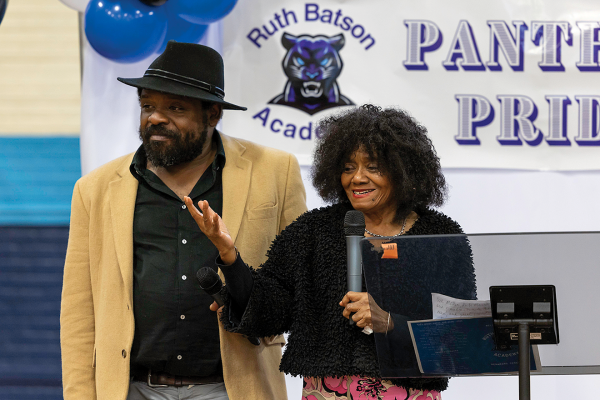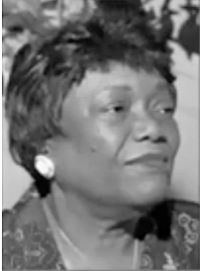October 2, 2024

Susan Batson, Ruth Batson’s daughter, and Carl Ford, Ruth Batson’s grandson, speak at the ceremony.

Last Thursday (Sept. 26), the recently merged Boston Community Leadership Academy/McCormack 7/12 School on Columbia Point’s Mt. Vernon Street was formally dedicated as Ruth Batson Academy in honor of an incredible leader who sixty and more years ago organized parents and residents to take on a recalcitrant Boston School Committee’s policies of maintaining second-rate schools for Black students.
Principal Ondrea Johnston led the effort to get the school so renamed by the current School Committee, which did so unanimously. She was assisted by Yvonne Vest and students from Ruth Batson Academy, some of whom spoke at a dedication event on Friday, including Yazamaya Guerrero, Wolf Antoine, and Nashaun Jackman.
Mayor Wu spoke of the importance of Ruth Batson’s life’s work. The current director of METCO, Milly Arbabje, spoke about her pioneering role in founding that organization. Ruth’s daughters, Susan and Dorothy, attended along with her grandchildren and great grandchildren.
“My mother was a force of nature,” said Susan Batson. “When she decided to do something, it got done.”
Grandson John Owusu urged the students attending to remember “that every day you step into this school, you get a chance to choose education. We didn’t get here by ourselves; we can’t go anywhere but together. Don’t let this die. Education is the first step to equality; put your hand out to help others.”
As a public housing tenant from Roxbury, Ruth was dissatisfied with the old ripped up textbooks and sub-par instruction that her kids were receiving to use. She took a bus to the Boston NAACP office in the South End and asked them to work on education. Soon she was asked to be education chair for the local NAACP organization.
“From that point on,” she later said, “my life changed profoundly. I learned how to sharpen my observation skills. I learned how to write reports...I lost all fear of ‘important’ people or organizations. I organized other parents in an effort to improve our children’s education.”
On June 12, 1963, she led a group of 800 predominantly Black residents to a School Committee meeting at a time when schools in Black communities got less funding than White schools, had the most unrepaired buildings, and were assigned the least experienced teachers. Mrs. Batson, Paul Parks, and Mel King led those attending in proposing 14 common sense proposals to improve the schools.
The committee, then chaired by Louise Day Hicks, rejected all their proposals, claiming that all students got an equal education, which led Batson to say, “These people were not only cold and callous; even worse, they were so uninformed.”
Coincidently, that same night, President John F. Kennedy held a national press conference to announce that he was filing a federal civil rights bill.
Undeterred by Day Hicks, Ruth and other leaders organized a “stay-out” on June 18 of that year, with 5,000 students leaving school to protest conditions at their schools. They attended Freedom Schools that were held in churches and community centers. And they did it again 11 years later, on Feb. 26, 1974, this time with 10,000 students participating.
Batson joined with others in a successful campaign that saw the passage by the Legislature of the State Racial Imbalance Law in 1965, the first of its kind in the country. It mandated that any school that was more than 50 percent students of color had to be desegregated or the local school system would lose state aid. The Boston School Committee responded to the law by denigrating it, then ignoring it, then appealing it in court. They lost the appeals.
To enable more Black children to get educational opportunity during the great resistance by the Boston School Committee, Batson founded METCO in 1967. At the time, this enabled 1,000 students to be bused to school in suburbs with more resources. Today 3,300 students of color from Boston attend school in 33 suburban school systems.
She also helped organize parents to file suit in federal court challenging the discrimination and segregation practices of the Boston School Committee. The lawsuit – Tallullah Morgan vs. James Hennigan – was filed on March 14, 1972, by 14 adults and 43 children. On June 21, 1974, Federal Judge W. Arthur Garrity ruled in favor of the plaintiffs, finding that the School Committee had illegally segregated the schools by drawing the lines of enrollment for schools to keep them segregated and many other resisting strategies.
On Sept. 12, 1974, when busing began as one of the remedies dictated from the court, there was massive opposition from many of the working class and poor White residents who were then a majority of the city’s residents. In an ugly turn outside of some high schools, adults and teens shouted or held signs with racial slurs while some threw rocks to break the windows of school buses with Black students inside. Though most schools stayed relatively peaceful, there were terrible battles between students based on race at South Boston, Charlestown, Hyde Park, and Roslindale high schools.
Ruth Batson rode on the school buses up to South Boston High School to see thingst first-hand and came away saying, “This was not why we did this.” She and other Black leaders wanted better schools with equal resources to what White students had and while that could have been done without busing, it was not.
She was a leader in the Freedom House Coalition of Black leaders and organizations and churches that met, often daily, to take action to support the students being attacked and engage decision-makers on public safety and education issues. She led the Boston University Consultation and Education Program and marshalled resources to support students traumatized by the treatment they got on the buses and in the schools. Somehow, she also made time to build up the African American History Museum in Boston.
Ruth Batson Academy is a Dorchester school named for a fighter for justice. With its hard-working teachers, administrators, and students, may they graduate generations of students who carry forward what Ruth Batson worked for so tirelessly.
Lew Finfer, a Dorchester resident, is co-chair of the Boston Desegregation and Busing Initiative.


